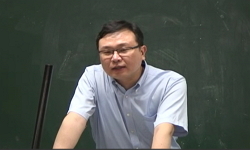본 연구는 모리스 블랑쇼와 발터 벤야민의 언어에 대한 사유에서 서로 얽혀드는 교차지점들을 찾고자 하였고 그 가운데 뚜렷이 드러나는 것으로 ‘번역’과 ‘궁극의 언어’의 문제에서 그...
http://chineseinput.net/에서 pinyin(병음)방식으로 중국어를 변환할 수 있습니다.
변환된 중국어를 복사하여 사용하시면 됩니다.
- 中文 을 입력하시려면 zhongwen을 입력하시고 space를누르시면됩니다.
- 北京 을 입력하시려면 beijing을 입력하시고 space를 누르시면 됩니다.

모리스 블랑쇼와 발터 벤야민 -‘번역’과 ‘궁극의 언어’ 문제- = Maurice Blanchot and Walter Benjamin - With Focus on the Ideas of ‘Translation’and ‘Ultimate Language’ -
한글로보기부가정보
국문 초록 (Abstract)
본 연구는 모리스 블랑쇼와 발터 벤야민의 언어에 대한 사유에서 서로 얽혀드는 교차지점들을 찾고자 하였고 그 가운데 뚜렷이 드러나는 것으로 ‘번역’과 ‘궁극의 언어’의 문제에서 그 실마리를 얻었다. 일찍이 벤야민은 직접 프루스트와 보들레르의 작품을 번역하는 열정을 보였는데, 1920년대 초 보들레르의 시집 일부인 을 번역하며 이 책의 서문으로 「번역자의 과제」란 짧은 글을 썼다. 이 서문에 관한 블랑쇼의 논평 「번역하다」란 글은 객관적으로 두 사람 간 어떤 연결 지점을 볼 수 있는 유일한 글이다. 블랑쇼 역시 카프카의 글 외에도 몇몇 독일 작품을 프랑스어로 번역했던 경험을 가졌기에 「번역하다」에는 벤야민의 번역관에 대한 고찰과 함께 그의 생각이 펼쳐져 있다. 이에 본 연구는 우선, 벤야민의 「번역자의 과제」를 꼼꼼히 읽어나가며 그에게서 ‘번역’의 의미가 무엇인지 살펴보고, ‘번역’이 종래에는 ‘궁극의 언어’, 즉 벤야민에 따르면 ‘순수언어’에 관련되어 있음을 밝히고자 하였다. 그런 다음 이러한 ‘궁극의 언어’란 측면에서 벤야민의 생각을 간파하고 이에 동의의 눈길을 보낸 블랑쇼의 논평을 토대로 둘의 사유의 교차점을 찾고자 하였다. 특히 책의 부재 혹은 비-현전으로서의 책을 말하는 블랑쇼의 사유와 벤야민의 궁극의 언어와의 관련성을 살펴보았다. 마지막으로는, 블랑쇼와 벤야민 모두에게 공통으로 보이는 일종의 메시아니즘적 언어관을 고찰하였다. 두 사람은 모두 번역과 궁극의 언어를 생각하는 데 있어 성서 텍스트가 그 바탕에 있었으며, 언어와 계시의 합일을 염두에 둔 메시아니즘적 언어관을 지녔다. 그들에게 궁극의 언어를 겨냥하는 번역 작업은 메시아적 무한성을 향한 과제이자 임무였다.
다국어 초록 (Multilingual Abstract)
Benjamin showed his passion for translating the works by Proust and Baudelaire. When he translated a part of Baudelaire’s poetry collection “Tableaux Parisiens (Paris Scenes)” in the early 1920s, he wrote a short essay titled “The Task of the Translator” as the preface to the book. Blanchot’s commentary titled "Translating" on this article is the only one that can objectively examine the connection between the two authors’ thoughts. Blanchot also translated several German works, including those by Kafka, into French, so "Translating" contains his interpretation of Benjamin’s view on translation, along with his reflections on it. In this study, first, we carefully read Benjamin’s “The Task of the Translator” to examine what he meant by “translation,” and to reveal that “translation” is ultimately related to “ultimate language,” or “pure language,” according to Benjamin. Then, based on the comments of Blanchot, who consented to Benjamin with regard to the latter’s idea of the ‘ultimate language,’ we tried to find the intersection of their thoughts. In particular, we examined the relationship between Benjamin’s ultimate language and Blanchot’s thoughts on the book: the “absence of the book (the book’s own self-undoing)” and its “non-presence (ambiguity and instability inherent in language).” Finally, I have examined a kind of messianic view of language that is commonly shown in the ideas of both Blanchot and Benjamin. Both of them had biblical texts as their basis for thinking about translation and ultimate language, and they had a messianic view of language that considered the unity of language and revelation. For them, the task of translation aimed at pursuing ultimate language was a task and a mission toward messianic infinity.
This study has attempted to examine the points of intersection in the thoughts of Maurice Blanchot and Walter Benjamin while maintaining their respective independent perspectives, and focused on the issues of ‘translation’ and ‘ultimate language...
This study has attempted to examine the points of intersection in the thoughts of Maurice Blanchot and Walter Benjamin while maintaining their respective independent perspectives, and focused on the issues of ‘translation’ and ‘ultimate language’ as two of the major ideas that are worthy of note.
Benjamin showed his passion for translating the works by Proust and Baudelaire. When he translated a part of Baudelaire’s poetry collection “Tableaux Parisiens (Paris Scenes)” in the early 1920s, he wrote a short essay titled “The Task of the Translator” as the preface to the book. Blanchot’s commentary titled "Translating" on this article is the only one that can objectively examine the connection between the two authors’ thoughts. Blanchot also translated several German works, including those by Kafka, into French, so "Translating" contains his interpretation of Benjamin’s view on translation, along with his reflections on it. In this study, first, we carefully read Benjamin’s “The Task of the Translator” to examine what he meant by “translation,” and to reveal that “translation” is ultimately related to “ultimate language,” or “pure language,” according to Benjamin. Then, based on the comments of Blanchot, who consented to Benjamin with regard to the latter’s idea of the ‘ultimate language,’ we tried to find the intersection of their thoughts. In particular, we examined the relationship between Benjamin’s ultimate language and Blanchot’s thoughts on the book: the “absence of the book (the book’s own self-undoing)” and its “non-presence (ambiguity and instability inherent in language).” Finally, I have examined a kind of messianic view of language that is commonly shown in the ideas of both Blanchot and Benjamin. Both of them had biblical texts as their basis for thinking about translation and ultimate language, and they had a messianic view of language that considered the unity of language and revelation. For them, the task of translation aimed at pursuing ultimate language was a task and a mission toward messianic infinity.
동일학술지(권/호) 다른 논문
-
- 성균관대학교 인문학연구원
- 김아연
- 2025
- KCI등재
-
1970년대 긴급조치 9호 세대의 학생운동과 국가폭력에 대한 ‘기억’
- 성균관대학교 인문학연구원
- 김상연
- 2025
- KCI등재
-
민청학련 당시 전국 학생운동 세력의 연계 시도에 대한 기억 -경북대, 전남대를 중심으로-
- 성균관대학교 인문학연구원
- 이길중
- 2025
- KCI등재
-
1970년대 후반 민청학련 세대의 활동과 제적의 ‘아이러니’
- 성균관대학교 인문학연구원
- 박경렬
- 2025
- KCI등재




 KCI
KCI KISS
KISS






